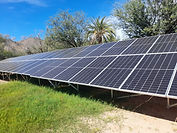
Energy, Food & Water Security
Comcaac Renewable Energy, Water and Food Security
Both Seris villages, Desemboque and Punta Chueca, are vulnerable to freshwater, food, and energy shortages due to climate disruptions- hurricanes, drought, rising sea levels, saltwater intrusion, and poverty. During the Covid-19 pandemic, the extent of the impact of inadequate electricity and lack of water was unmasked when oxygen concentrators faltered, and sanitation ebbed in the clinics.
Stronger and more frequent storms and hurricanes frequently cut off communications and flooding can block transportation routes for days. As imported food supplies dwindle, the community members are rediscovering the importance of subsistence fishing, hunting and gathering, and growing foods and medicine from the desert.
Solar Power

A team of Comcaac women traveled to India to train in solar panel technology with Barefoot College, returning with technical skills and a vision to bring solar energy to their communities. Thanks to the generous support of the Honnold Foundation, in 2020, Borderlands Restoration Network partnered with these indigenous solar technicians known as the “Mamas Solares” to provide 30 families in Desemboque with solar panels and install 60 solar panels to power the community well.
Household energy costs have been reduced by over fifty percent allowing savings for basic needs.



Food Security
Transformative change is accomplished by intervening at the nexus of energy, water, and food security. One way this is accomplished is by cultivating family food gardens under the shade of solar panels. This co-location of food and renewable energy buffers against the desert heat and reduces water evaporation significantly. The panels do more than provide renewable energy and clean water, they also provide shade, another resource in short supply.
“Agro-volteic” panels create a buffer against the intense heat and aridity of the Sonoran coast for food crops grown in these new shady spots. The plants in turn, cool the solar panels as they take in carbon dioxide and release oxygen and water, enabling the panels to operate more efficiently. Growing desert-adapted native crops such as tomatillos, chiles, and tepary beans not only increases food access and improves health but also can provide an additional source of income. Food and health needs are addressed with the extra money saved from reduced electric bills.



READ ARTICLE (IN SPANISH):
Destacan el éxito de los huertos agrovoltaicos para comunidades originarias en Sonora

NEXT STEPS
Ensure each of the 200 Comcaac families have access to solar panels, household gardens, and clean water.
-
Install 30 additional solar panels
-
Equip solar kitchens with energy-saving cooking equipment
-
Monitor and advocate for clean drinking water
-
Engage families and youth in food cultivation and healthy eating
-
Improve community health and well-being
The Mamas Solares- Verónica Molina & Cecilia Moreno
Comcaac External Affairs Officers Alberto Mellado & Gabriela Molina
President of the Ejido Comcaac, Ángel Montano
Solarex, Santiago Aguirre
Secretary of Economy of the State of Sonora, Dr. Rafael Cabanillas-Lopez
Universidad de Sonora Solar Energy Platform of Hermosillo, Dr. Rodolfo Peón
University of Arizona Southwest Center & College of Public Health
_edited.png)
![Logotipo Oficial Unison[71].jpg](https://static.wixstatic.com/media/e113cc_0e6cf8a0623041dea7ff568ec30adf87~mv2.jpg/v1/crop/x_0,y_0,w_350,h_326/fill/w_151,h_141,al_c,q_80,usm_0.66_1.00_0.01,enc_avif,quality_auto/Logotipo%20Oficial%20Unison%5B71%5D.jpg)
